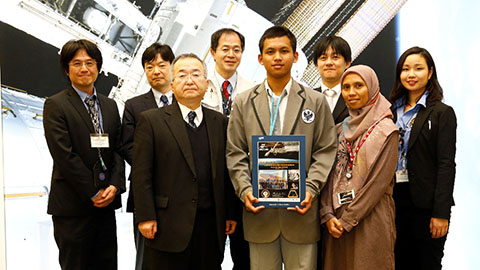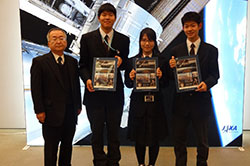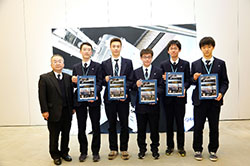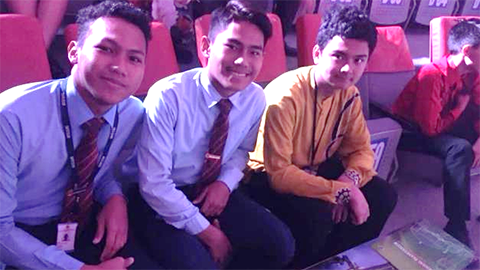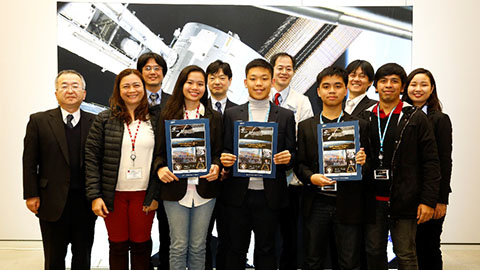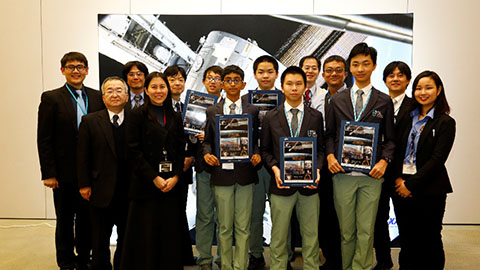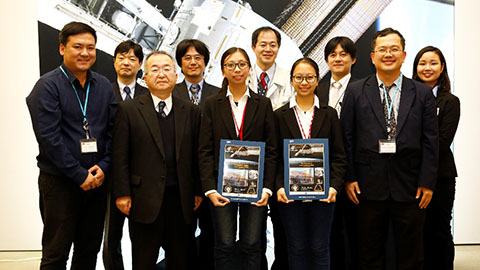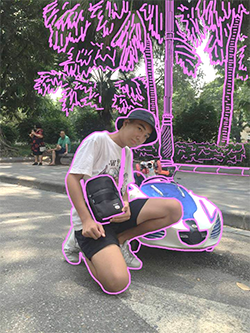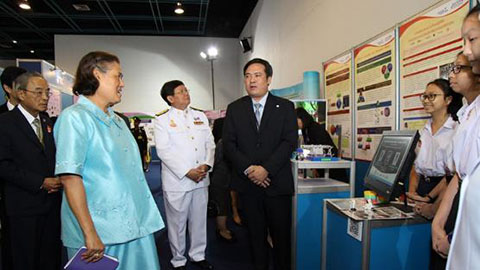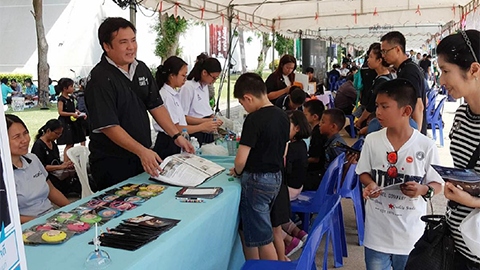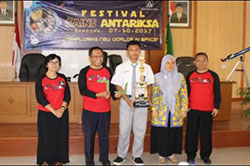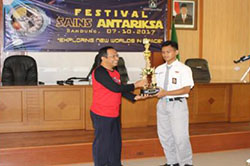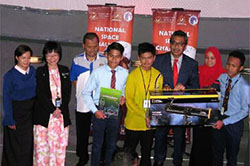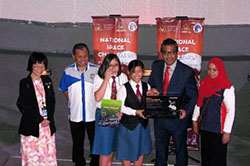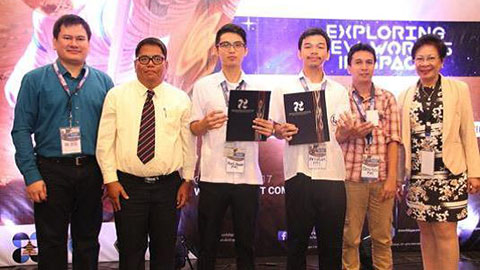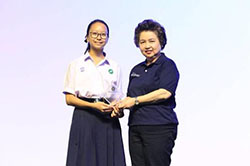This is an archive of information released in the past.
Disclaimer: It may contain broken links or outdated information. Some parts may not function in current web browsers.
*Visit https://humans-in-space.jaxa.jp/en/ for the latest information.

Kibo-ABC Member Countries' News: Asian Try Zero-G 2018 Ground Activities
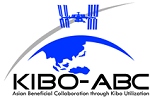
Asian Try Zero-G 2018 was successfully performed onboard the International Space Station (ISS)/Kibo on 13th February. Eight experiments (selected from over 160 proposals from over 360 Asian students and young engineers/researchers) were performed by JAXA astronaut Norishige Kanai. (click here for Photos and Videos of the experiments) On the ground, a lot of educational events, exhibitions and awarding ceremonies were conducted throughout Asian. Through these activities, people learned to recognize the importance of space utilization of ISS/Kibo and how interesting space experiments are. Such ground activities also motivate young people to pursue space science and development.
Messages from Asian Try Zero-G 2018 Participants
Indonesia
(Credit: JAXA)
All activities are fun and interesting. I really enjoyed my time here. I'll never forget this experience because not only is it my first visit to Japan, it's the first time for me to come to go overseas as well.
Japan
(Credit: JAXA)
It was awesome today! I was so excited. I had known since last summer that our experiments were to be conducted on the International Space Station, but still became very excited on the very day I visited the JAXA Tsukuba Space Center to finally witness the experiments. I really enjoyed communicating with Astronaut Kanai as if I were actually onboard the ISS watching his experiments. I was surprised at the unexpected results, but I believe that the experiments were well done with 120% completion. Had the results been what we had expected, it would have been just perfect. And what was even better, we learned much more than what we could ever expect before. Therefore, I consider it a 120% success. It was such a meaningful experience for me to be here today. Thank you very much. [Paper spring experiment team]
I had a valuable opportunity today that may hardly ever be offered again in my life. It was also a great experience to meet a variety of people from each participating country. I was surprised at the results of the experiments which were fairly different from our assumptions. On the other hand, a strong hypothesis turned out in a most unlikely and unexpected way, which proved consistent with our assumption. After observing the two behavioral patterns of the spinning wire tops, spinning still or upside down, we found that the results were based on a hypothesis not well supported among our team members as we discussed the reason why the wire top spins upside down. Our experiments were probably about 50% successful as one result of three hypotheses proved to be perfect, another was totally different, and the rest was very close to reflecting our hypothesis. Therefore, I think the overall experiments demonstrate a 50% success rate. I am very grateful to all the JAXA people concerned. [Wire top experiment team]
Malaysia
(Credit: MOSTI)
We recently watched the onboard experiment video and found it very interesting. We were very surprised at the result of the experiment where the ring could not escape its rotation. We think that such surprise is what you feel when conducting a scientific experiment. And just making a proposal for an experiment you would never be able to do in your lifetime was a lot of fun. The struggle to form a hypothesis was very challenging for us, even though we received some help from our science teacher (Mrs. Iffah). Nonetheless, we were able to experience the feelings of scientists in the past, that is, to satisfy their own curiosity by conducting experiments. And through these experiments, we were able to make more sense of the world and change how we approach our problems.
Philippines
(Credit: JAXA)
We thought all the activities were very informative, productive and fun. We really enjoyed them. In the morning, we joined the rover mission simulation program. Controlling the rover to see all the faces was really challenging but interesting and so was the communication skill at the rover mission. It was nice to learn how the space agency in Japan communicates between the ISS and astronauts. Our perspective of astronomy and space agencies expanded. It was also nice to learn about many different experiments and conditions in zero gravity, which could be applied in various fields such as physics and astrophysics. Finding and knowing more about zero gravity may give us more ways to travel and to live in space in the future. We were so inspired. Our experiment was very successful. Thank you very much, Mr. Kanai. It was conducted smoothly and it was perfect.
Singapore
(Credit: JAXA)
Today's activities were, certainly, extremely exciting. JAXA did a wonderful job of showing us how the space people can work. We experienced so many unexpected things and have learned a lot. During the EVA mission simulation program. we learned how communication and team work were key to be successful in most space missions. The experiments were amazing. Everything in space is very different from what we thought. We predicted the boomerang would work in space and return to the astronaut, but in the actual experiments it didn't return to him. For the Gyroscope in space, we had already done the experiments on the ground, but results were different on some experiment conditions. We'd like to do this kind of activity again. Thank you.
Thailand
(Credit: JAXA)
Today was really awesome! We have learned a lot of things through the activities and real simulation program with friends from Asian countries who share the same interest in space as us. In the conference, students from the other countries presented their experiments. This was also fun. We actually watched an astronaut carry out our experiment on the ISS in real time. That was all accomplished. Our experiment and the results were the same as we had expected: a ball bounced around in the slinky until nothing occurred anymore. It kept bouncing in there. Therefore, it was quite successful in terms of our assumption being right. This also inspired us to look more deeply into the motion in theory because it did not seem to use much energy to move. So from our perspective, the experiments were 100% successful.
Vietnam
(Credit: VAST)
I had a lot of fun participating in this experiment. It has given me new knowledge about where we are now living and how different it is outside. We have encountered several problems through this project, and the challenge helped me learn how to effectively work with the people around me and guided me in the ways to become a good leader. Thank you so much!
Exhibition
Thailand
(Credit: NSTDA)
HRH Princess Sirindhorn visited the Asian Try Zero-G exhibition of NSTDA Annual Conference 2018.
(Credit: NSTDA)
Asian Try Zero-G Exhibition of the 1st Thailand Aviation and Space Festival
Awarding Ceremony
Indonesia
(Credit: LAPAN)
Awarding ceremony for the experiment proposer by the president of LAPAN at Space Science Festival in Indonesia
Malaysia
(Credit: MOSTI)
Awarding ceremony for Malaysian proposers by the deputy minister of MOSTI at National Space Challenge 2017 in Malaysia
Philippines
(Credit: DOST)
Awarding ceremony for the proposers in Philippines
Thailand
(Credit: NSTDA)
Awarding ceremony for the proposers by the minister of MOST at National Science and Technology Fair 2017 in Thailand
Kibo-ABC Member Agency's Website
Indonesia(LAPAN)
Singapore(SSTA)
Thailand(NSTDA)
| Copyright 2007 Japan Aerospace Exploration Agency | Site Policy |

